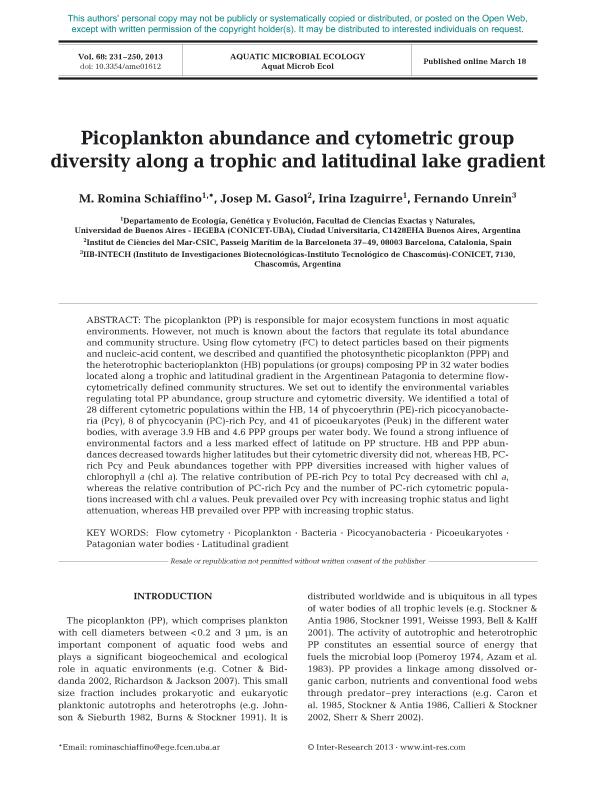Mostrar el registro sencillo del ítem
dc.contributor.author
Schiaffino, María Romina

dc.contributor.author
Gasol, Josep M.

dc.contributor.author
Izaguirre, Irina

dc.contributor.author
Unrein, Fernando

dc.date.available
2017-07-06T18:55:12Z
dc.date.issued
2013-03
dc.identifier.citation
Schiaffino, María Romina; Gasol, Josep M.; Izaguirre, Irina; Unrein, Fernando; Picoplankton abundance and cytometric group diversity along a trophic and latitudinal lake gradient; Inter-Research; Aquatic Microbial Ecology; 68; 3; 3-2013; 231-250
dc.identifier.issn
0948-3055
dc.identifier.uri
http://hdl.handle.net/11336/19769
dc.description.abstract
The picoplankton (PP) is responsible for major ecosystem functions in most aquatic environments. However, not much is known about the factors that regulate its total abundance and community structure. Using flow cytometry (FC) to detect particles based on their pigments and nucleic-acid content, we described and quantified the photosynthetic pico plankton (PPP) and the heterotrophic bacterioplankton (HB) populations (or groups) composing PP in 32 water bodies located along a trophic and latitudinal gradient in the Argentinean Pata gonia to determine flowcytometrically defined community structures. We set out to identify the environmental variables regulating total PP abundance, group structure and cytometric diversity. We identified a total of 28 different cytometric populations within the HB, 14 of phycoerythrin (PE)-rich picocyanobacteria (Pcy), 8 of phycocyanin (PC)-rich Pcy, and 41 of picoeukaryotes (Peuk) in the different water bodies, with average 3.9 HB and 4.6 PPP groups per water body. We found a strong influence of environmental factors and a less marked effect of latitude on PP structure. HB and PPP abundances decreased towards higher latitudes but their cytometric diversity did not, whereas HB, PCrich Pcy and Peuk abundances together with PPP diversities increased with higher values of chlorophyll a (chl a). The relative contribution of PE-rich Pcy to total Pcy decreased with chl a, whereas the relative contribution of PC-rich Pcy and the number of PC-rich cytometric populations increased with chl a values. Peuk prevailed over Pcy with increasing trophic status and light attenuation, whereas HB prevailed over PPP with increasing trophic status.
dc.format
application/pdf
dc.language.iso
eng
dc.publisher
Inter-Research

dc.rights
info:eu-repo/semantics/openAccess
dc.rights.uri
https://creativecommons.org/licenses/by-nc-sa/2.5/ar/
dc.subject
Picoplankton
dc.subject
Flow Cytometry
dc.subject
Lakes
dc.subject
Patagonia
dc.subject.classification
Ecología

dc.subject.classification
Ciencias Biológicas

dc.subject.classification
CIENCIAS NATURALES Y EXACTAS

dc.title
Picoplankton abundance and cytometric group diversity along a trophic and latitudinal lake gradient
dc.type
info:eu-repo/semantics/article
dc.type
info:ar-repo/semantics/artículo
dc.type
info:eu-repo/semantics/publishedVersion
dc.date.updated
2017-07-05T15:46:45Z
dc.journal.volume
68
dc.journal.number
3
dc.journal.pagination
231-250
dc.journal.pais
Alemania

dc.journal.ciudad
Oldendorf/Luhe
dc.description.fil
Fil: Schiaffino, María Romina. Consejo Nacional de Investigaciones Científicas y Técnicas. Oficina de Coordinación Administrativa Ciudad Universitaria. Instituto de Ecología, Genética y Evolución de Buenos Aires. Universidad de Buenos Aires. Facultad de Ciencias Exactas y Naturales. Instituto de Ecología, Genética y Evolución de Buenos Aires; Argentina
dc.description.fil
Fil: Gasol, Josep M.. Consejo Superior de Investigaciones Científicas. Instituto de Ciencias del Mar; España
dc.description.fil
Fil: Izaguirre, Irina. Consejo Nacional de Investigaciones Científicas y Técnicas. Oficina de Coordinación Administrativa Ciudad Universitaria. Instituto de Ecología, Genética y Evolución de Buenos Aires. Universidad de Buenos Aires. Facultad de Ciencias Exactas y Naturales. Instituto de Ecología, Genética y Evolución de Buenos Aires; Argentina
dc.description.fil
Fil: Unrein, Fernando. Consejo Nacional de Investigaciones Científicas y Técnicas. Centro Científico Tecnológico Conicet - La Plata. Instituto de Investigaciones Biotecnológicas. Instituto de Investigaciones Biotecnológicas "Dr. Raúl Alfonsín" (sede Chascomús). Universidad Nacional de San Martín. Instituto de Investigaciones Biotecnológicas. Instituto de Investigaciones Biotecnológicas "Dr. Raúl Alfonsín" (sede Chascomús); Argentina
dc.journal.title
Aquatic Microbial Ecology

dc.relation.alternativeid
info:eu-repo/semantics/altIdentifier/doi/http://dx.doi.org/10.3354/ame01612
dc.relation.alternativeid
info:eu-repo/semantics/altIdentifier/url/http://www.int-res.com/abstracts/ame/v68/n3/p231-250/
Archivos asociados
